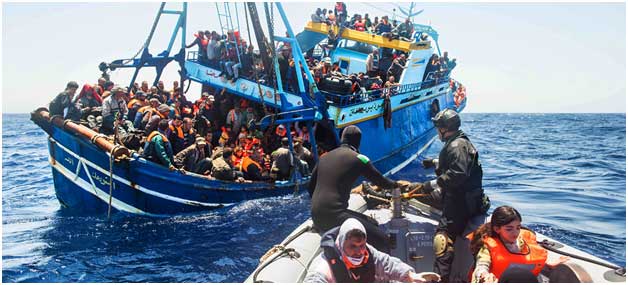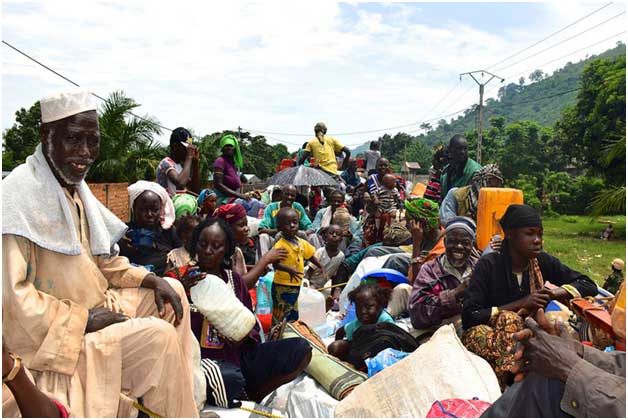Civil Society, Development & Aid, Environment, Global, Headlines, Human Rights, Migration & Refugees, TerraViva United Nations
Lasse Juhl Morthorst* is a freelance writer and researcher. He mainly works on international politics, development, refugee- and human rights issues.

Credit: United Nations
– According to political scientist Zaki Laïdi’s La tyrannie de l’urgence (The tyranny of emergency) from 1999, crisis and emergency situations leave no time for analysis, prevention or forecasting. As an immediate protective reflex, they prevent long-term solutions and pose a serious risk of jeopardising the future.
In emergency situations, participants lack perspective, and durable solutions to human problems are treated according to the logic of immediate results and expectations of direct outcomes.
The effects of globalisation’s deepening and fragmenting landscape highlights how governance with short-term efficiency has become normative when dealing with contemporary challenges.
The so-called European refugee crisis from late 2014 and, if we buy its premise, its aftermath have come to symbolise such an emergency situation.
Contemporary political responses expose the electorate and the parties, who respectively gain and lose in the processes of globalisation.
This socio-political cleavage has allowed centre-right parties to take advantage of nationalistic values, with migration viewed through the lens of security – limitation of migration flows and the fight against terrorist groups – law and order, while the centre-left have had to bridge the working class’s fear of cheap labour and economic competition with the middle-class’s liberal socio-cultural preferences.
The European Union’s reaction towards the crisis and its aftermath cannot be seen as a political crisis reaction per se, since the solutions it initiated to manage migration built on existing legislation and practices, helping to consolidate these as routinising emergency in order to naturalise migration politics.
There is a clear political red line between addressing so-called root causes and managing migration by securing external borders and preventing movement of third-country nationals.
This is anchored in the European Commission’s comprehensive approach in the 1994 Communication to the Council, reconfirmed through the integrated approach at the 1999 European Council meeting in Tampere, and developed at the 2002 Seville meeting, where combating illegal migration and addressing root causes were top of the agenda.
What we are witnessing is rather a political crisis, which has lasted for more than a quarter of a century.

Lasse Juhl Morthorst
How did we get here?
As a result of a sceptical post-1973 oil crisis scenario, addressing root causes of migration emerged in the 1980s, with the aim of improving socio-economic conditions in the countries of migrants’ origin, to prevent unwanted migration towards Europe.
When the European Community was developing the single market, with the fluidity of the EU’s internal national borders to facilitate free internal mobility as an outcome, the fear of losing control of external migration became an increasing concern for member states.
The EU’s migration policies have, with their primary focus on securitisation, come to symbolise a harmful politicisation of humanitarianism, which seems to persist into the new Commission’s 2019-2024 period and very like beyond.
In the following years, little progress was made towards a unified European migration policy. As a result, the Commission proposed the idea of a comprehensive approach to migration in 1994.
This consisted of a threefold focus: action on migration pressure through third-country cooperation, controlling immigration to make it manageable and optimisation of integration policies for legal migrants.
The root cause approach was to be seen as a long-term humanitarian development solution to the migration ‘problem’. The ideas of cooperation and addressing root causes have become the popular political take on the EU’s migration challenges, which rhetorically attempt to circumvent the negative connotations of strict migration control and hostility.

Credit: United Nations
During the last decades, the EU has been searching for a new strategic rationalist raison d’être for its common asylum policy, through harmonisation of the EU asylum legal acts, the Common European Asylum System and attempting to solve the stalemate between member states and intra-institutionally, regarding the Dublin system’s tightening Gordian knot.
The EU has failed to solve the structural and systemic impasse in approaching migration flows, which will not end by continuing harshened border controls and security measures, earmarked development aid, externalisation processes or dubious bilateral agreements.
The EU’s migration policies have, with their primary focus on securitisation, come to symbolise a harmful politicisation of humanitarianism, which seems to persist into the new Commission’s 2019-2024 period and very like beyond.
Nothing new from Brussels?
Ursula von der Leyen’s new Commission is taking office in a situation shaped by vast global challenges of geopolitical turbulence and internal fragmentation, towards which she has proposed a rather pragmatic and strategic approach.
Through her manifesto and mission letters to the designated Commissioners, von der Leyen’s new ‘geopolitical Commission’ will focus on making the EU an outward-looking politically influential global powerhouse, which must protect the Union from omnipresent geopolitical and external value-based challenges.
She has proposed ‘a fresh start’ on European migration policy, via a new pact on migration and asylum, a relaunch of the Dublin reform and a new way of burden sharing (the Achilles heel of the Dublin reform).
In charge of this agenda will be Commission Vice-President for Promoting the European Way of Life Margaritis Schinas (Greece), who will work closely with Ylva Johansson (Sweden), the Commissioner for Home Affairs, and Development Commissioner Jutta Urpilainen (Finland).
There are clear tensions and ambiguity in von der Leyen’s agenda towards migration and development, which has toxically been coined with security politics, as it has to find a ‘common ground on migration by working towards a genuine European security union’.
The external dimensions of migration management are explicitly present in the mission letters to both Schinas and Johansson. In these letters, they are instructed to cooperate with the new High Representative of the Union for Foreign Affairs and Security Policy (Josep Borrell, Spain), to develop a ‘stronger cooperation with countries of origin and transit’ in the case of Johansson and ensure ‘the coherence of the external and internal dimensions of migration’ for Schinas.
The EU’s interaction with third countries and partnerships of border control are narrow and ultimately self-eroding.
Beyond the initial internal focus against the backdrop of the eurozone and financial crises, this aligns closely with the Juncker Commission’s focus on the external dimensions of migration.
In 2015, the European Union Emergency Trust Fund for Africa was founded to intensify cooperation with third countries. Migration is also, beyond the Trust Fund, a central element in EU foreign policy and it has further come to divide views in the debate regarding development policy.
It appears that the Union is proposing to work even more closely with partner countries to tackle human trafficking, secure borders, optimise effective returns and tackle root causes of migration through development initiatives. Schinas confirmed this at his hearing on 3 October 2019.
A reminder from the ‘field’
The collaboration with third countries regarding externalisation of borders is vastly problematic, since in some cases, as a trade-off through the funding of development aid earmarked for increased border control, it comes to support militias and authoritarian and hybrid governments.
A large amount of the support often ends up in quasi security organs of rebel groups, which have been seen continuously abusing human rights.
This can presently be witnessed in nations in the Sahel, Maghreb and MENA regions – where tight border control has led to the diversification of pre-colonial circular and reciprocal migrant routes into increasingly perilous areas and methods, along with the risk of promoting economic stagnation, recession and militia isolation.
The diversification of migration routes ultimately creates a favourable environment for the human smugglers that the Union is trying to eliminate.
The EU’s interaction with third countries and partnerships of border control are narrow and ultimately self-eroding. These policies do not tackle any root causes of migration; by aiding regional security units and military forces, they risk limiting democratic accountability and aggravating repression – some of the actual root causes of migration.
Agreements of principles and statements of intention do not compensate for the deflection of focus of an international community’s failure to get to grips with the need of today’s migrants for protection and recognition.
Von der Leyen’s agenda seems like an anachronistic reverberation of the unsuccessful policies introduced more than three decades ago, despite the opportunity to begin abolishing the tyranny of emergency.
*This article first appeared in International Politics and Society (IPS) published by the International Political Analysis Unit of the Friedrich-Ebert-Stiftung, Hiroshimastrasse 28, D-10785 Berlin.
